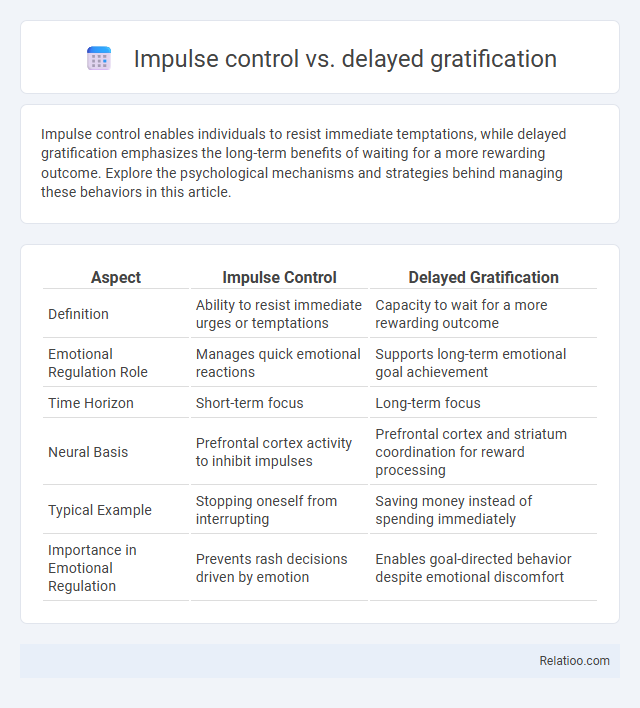Impulse control enables individuals to resist immediate temptations, while delayed gratification emphasizes the long-term benefits of waiting for a more rewarding outcome. Explore the psychological mechanisms and strategies behind managing these behaviors in this article.
Table of Comparison
| Aspect | Impulse Control | Delayed Gratification |
|---|---|---|
| Definition | Ability to resist immediate urges or temptations | Capacity to wait for a more rewarding outcome |
| Emotional Regulation Role | Manages quick emotional reactions | Supports long-term emotional goal achievement |
| Time Horizon | Short-term focus | Long-term focus |
| Neural Basis | Prefrontal cortex activity to inhibit impulses | Prefrontal cortex and striatum coordination for reward processing |
| Typical Example | Stopping oneself from interrupting | Saving money instead of spending immediately |
| Importance in Emotional Regulation | Prevents rash decisions driven by emotion | Enables goal-directed behavior despite emotional discomfort |
Understanding Impulse Control
Impulse control is the ability to resist immediate temptations and urges, enabling better decision-making and long-term goal achievement. It involves regulating emotional responses and delaying gratification, which enhances self-discipline and reduces impulsive behaviors. Impulse control plays a critical role in managing behaviors related to addiction, attention disorders, and emotional regulation.
Defining Delayed Gratification
Delayed gratification refers to the ability to resist the temptation of an immediate reward in favor of a later, often larger or more enduring benefit. Unlike impulse control, which involves suppressing spontaneous urges or actions, delayed gratification requires sustained self-discipline and future-oriented thinking. Your success in managing desires through delayed gratification can lead to improved decision-making, higher academic achievement, and long-term emotional well-being.
The Psychology Behind Impulses and Patience
Impulse control involves the ability to resist immediate temptations in favor of long-term benefits, engaging brain regions like the prefrontal cortex responsible for executive function. Delayed gratification reflects a strategic postponement of reward, linked to stronger self-regulation and better life outcomes as demonstrated in psychological studies such as the Marshmallow Test. Understanding the psychology behind impulses and patience reveals that developing impulse control enhances decision-making capabilities and emotional regulation, fostering resilience and goal achievement.
Benefits of Practicing Delayed Gratification
Practicing delayed gratification enhances your self-discipline by strengthening impulse control, allowing you to resist immediate temptations in favor of long-term rewards. This skill improves decision-making, reduces impulsive behaviors, and fosters patience, leading to better financial stability, healthier relationships, and personal growth. Emphasizing delayed gratification cultivates resilience and goal-oriented mindset, making it a crucial component of emotional intelligence and overall well-being.
Common Challenges in Impulse Control
Impulse control challenges often arise from immediate desires conflicting with long-term goals, causing difficulties in resisting temptations such as unhealthy food, impulsive spending, or emotional outbursts. Delayed gratification requires sustaining self-discipline over time, but poor impulse control can lead to regret and hinder progress toward personal achievements. Understanding these common struggles helps you develop strategies to improve self-regulation and achieve better behavioral outcomes.
Real-Life Examples of Delayed Gratification
Delayed gratification is exemplified by saving money over time to purchase a high-quality item instead of making impulsive buys. Individuals who practice impulse control often resist immediate temptations like unhealthy snacks to maintain long-term health goals. In contrast, impulse control primarily involves momentary self-restraint, whereas delayed gratification emphasizes sustained patience for more significant rewards.
Impulse Control in Children and Adults
Impulse control in children and adults is a critical factor in emotional regulation and decision-making, enabling individuals to resist immediate temptations in favor of long-term benefits. Developing strong impulse control skills enhances your ability to manage behaviors, reduce risk-taking, and improve social interactions across various age groups. While delayed gratification involves postponing rewards, impulse control emphasizes the immediate management of urges, crucial for personal and professional success.
Strategies to Strengthen Self-Control
Strategies to strengthen self-control involve practicing delayed gratification by setting clear goals and rewarding yourself only after completing tasks, which enhances your ability to resist impulsive behaviors. Techniques such as mindfulness meditation and cognitive reframing help increase awareness of impulses and reinforce deliberate decision-making. Combining these approaches improves impulse control, enabling you to make thoughtful choices and achieve long-term benefits.
The Role of Environment in Shaping Impulses
The environment plays a crucial role in shaping impulses by influencing immediate desires and self-regulation capabilities. Impulse control often depends on external cues such as social settings and stress levels, which can either trigger or mitigate spontaneous reactions. Your ability to exercise delayed gratification improves significantly when your surroundings promote focus, reduce distractions, and encourage long-term reward valuation.
Long-Term Success Linked to Delayed Gratification
Delayed gratification plays a crucial role in long-term success by enabling you to prioritize future rewards over immediate temptations, strengthening impulse control over time. Research indicates that individuals who practice delayed gratification exhibit higher academic achievement, better health outcomes, and increased financial stability. Developing strong impulse control through delayed gratification fosters resilience and goal-oriented behavior essential for sustained success.

Infographic: Impulse control vs Delayed gratification
 relatioo.com
relatioo.com